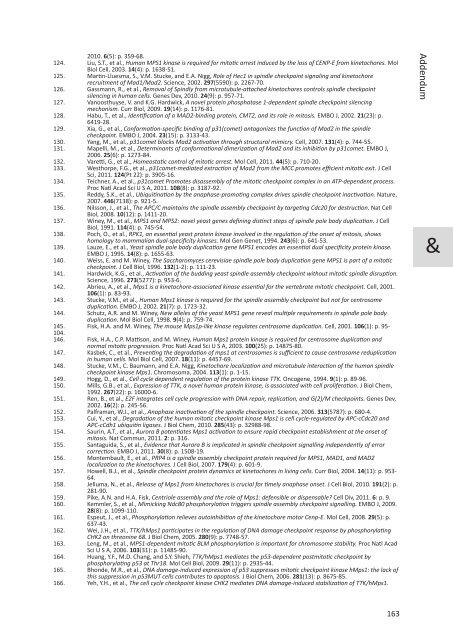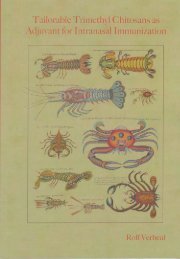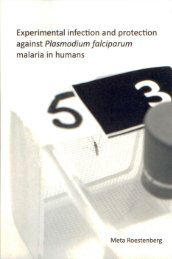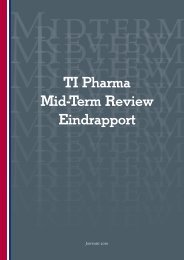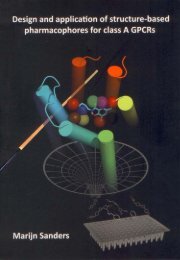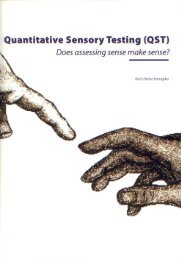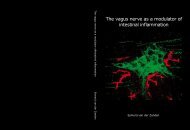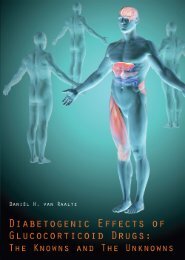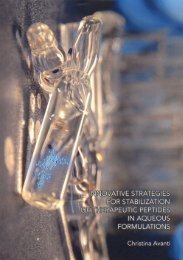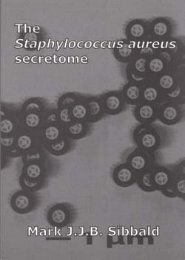Chromosome segregation errors: a double-edged sword - TI Pharma
Chromosome segregation errors: a double-edged sword - TI Pharma
Chromosome segregation errors: a double-edged sword - TI Pharma
You also want an ePaper? Increase the reach of your titles
YUMPU automatically turns print PDFs into web optimized ePapers that Google loves.
2010. 6(5): p. 359-68.<br />
124. Liu, S.T., et al., Human MPS1 kinase is required for mitotic arrest induced by the loss of CENP-E from kinetochores. Mol<br />
Biol Cell, 2003. 14(4): p. 1638-51.<br />
125. Martin-Lluesma, S., V.M. Stucke, and E.A. Nigg, Role of Hec1 in spindle checkpoint signaling and kinetochore<br />
recruitment of Mad1/Mad2. Science, 2002. 297(5590): p. 2267-70.<br />
126. Gassmann, R., et al., Removal of Spindly from microtubule-attached kinetochores controls spindle checkpoint<br />
silencing in human cells. Genes Dev, 2010. 24(9): p. 957-71.<br />
127. Vanoosthuyse, V. and K.G. Hardwick, A novel protein phosphatase 1-dependent spindle checkpoint silencing<br />
mechanism. Curr Biol, 2009. 19(14): p. 1176-81.<br />
128. Habu, T., et al., Identification of a MAD2-binding protein, CMT2, and its role in mitosis. EMBO J, 2002. 21(23): p.<br />
6419-28.<br />
129. Xia, G., et al., Conformation-specific binding of p31(comet) antagonizes the function of Mad2 in the spindle<br />
checkpoint. EMBO J, 2004. 23(15): p. 3133-43.<br />
130. Yang, M., et al., p31comet blocks Mad2 activation through structural mimicry. Cell, 2007. 131(4): p. 744-55.<br />
131. Mapelli, M., et al., Determinants of conformational dimerization of Mad2 and its inhibition by p31comet. EMBO J,<br />
2006. 25(6): p. 1273-84.<br />
132. Varetti, G., et al., Homeostatic control of mitotic arrest. Mol Cell, 2011. 44(5): p. 710-20.<br />
133. Westhorpe, F.G., et al., p31comet-mediated extraction of Mad2 from the MCC promotes efficient mitotic exit. J Cell<br />
Sci, 2011. 124(Pt 22): p. 3905-16.<br />
134. Teichner, A., et al., p31comet Promotes disassembly of the mitotic checkpoint complex in an ATP-dependent process.<br />
Proc Natl Acad Sci U S A, 2011. 108(8): p. 3187-92.<br />
135. Reddy, S.K., et al., Ubiquitination by the anaphase-promoting complex drives spindle checkpoint inactivation. Nature,<br />
2007. 446(7138): p. 921-5.<br />
136. Nilsson, J., et al., The APC/C maintains the spindle assembly checkpoint by targeting Cdc20 for destruction. Nat Cell<br />
Biol, 2008. 10(12): p. 1411-20.<br />
137. Winey, M., et al., MPS1 and MPS2: novel yeast genes defining distinct steps of spindle pole body duplication. J Cell<br />
Biol, 1991. 114(4): p. 745-54.<br />
138. Poch, O., et al., RPK1, an essential yeast protein kinase involved in the regulation of the onset of mitosis, shows<br />
homology to mammalian dual-specificity kinases. Mol Gen Genet, 1994. 243(6): p. 641-53.<br />
139. Lauze, E., et al., Yeast spindle pole body duplication gene MPS1 encodes an essential dual specificity protein kinase.<br />
EMBO J, 1995. 14(8): p. 1655-63.<br />
140. Weiss, E. and M. Winey, The Saccharomyces cerevisiae spindle pole body duplication gene MPS1 is part of a mitotic<br />
checkpoint. J Cell Biol, 1996. 132(1-2): p. 111-23.<br />
141. Hardwick, K.G., et al., Activation of the budding yeast spindle assembly checkpoint without mitotic spindle disruption.<br />
Science, 1996. 273(5277): p. 953-6.<br />
142. Abrieu, A., et al., Mps1 is a kinetochore-associated kinase essential for the vertebrate mitotic checkpoint. Cell, 2001.<br />
106(1): p. 83-93.<br />
143. Stucke, V.M., et al., Human Mps1 kinase is required for the spindle assembly checkpoint but not for centrosome<br />
duplication. EMBO J, 2002. 21(7): p. 1723-32.<br />
144. Schutz, A.R. and M. Winey, New alleles of the yeast MPS1 gene reveal multiple requirements in spindle pole body<br />
duplication. Mol Biol Cell, 1998. 9(4): p. 759-74.<br />
145. Fisk, H.A. and M. Winey, The mouse Mps1p-like kinase regulates centrosome duplication. Cell, 2001. 106(1): p. 95-<br />
104.<br />
146. Fisk, H.A., C.P. Mattison, and M. Winey, Human Mps1 protein kinase is required for centrosome duplication and<br />
normal mitotic progression. Proc Natl Acad Sci U S A, 2003. 100(25): p. 14875-80.<br />
147. Kasbek, C., et al., Preventing the degradation of mps1 at centrosomes is sufficient to cause centrosome reduplication<br />
in human cells. Mol Biol Cell, 2007. 18(11): p. 4457-69.<br />
148. Stucke, V.M., C. Baumann, and E.A. Nigg, Kinetochore localization and microtubule interaction of the human spindle<br />
checkpoint kinase Mps1. Chromosoma, 2004. 113(1): p. 1-15.<br />
149. Hogg, D., et al., Cell cycle dependent regulation of the protein kinase TTK. Oncogene, 1994. 9(1): p. 89-96.<br />
150. Mills, G.B., et al., Expression of TTK, a novel human protein kinase, is associated with cell proliferation. J Biol Chem,<br />
1992. 267(22): p. 16000-6.<br />
151. Ren, B., et al., E2F integrates cell cycle progression with DNA repair, replication, and G(2)/M checkpoints. Genes Dev,<br />
2002. 16(2): p. 245-56.<br />
152. Palframan, W.J., et al., Anaphase inactivation of the spindle checkpoint. Science, 2006. 313(5787): p. 680-4.<br />
153. Cui, Y., et al., Degradation of the human mitotic checkpoint kinase Mps1 is cell cycle-regulated by APC-cCdc20 and<br />
APC-cCdh1 ubiquitin ligases. J Biol Chem, 2010. 285(43): p. 32988-98.<br />
154. Saurin, A.T., et al., Aurora B potentiates Mps1 activation to ensure rapid checkpoint establishment at the onset of<br />
mitosis. Nat Commun, 2011. 2: p. 316.<br />
155. Santaguida, S., et al., Evidence that Aurora B is implicated in spindle checkpoint signalling independently of error<br />
correction. EMBO J, 2011. 30(8): p. 1508-19.<br />
156. Montembault, E., et al., PRP4 is a spindle assembly checkpoint protein required for MPS1, MAD1, and MAD2<br />
localization to the kinetochores. J Cell Biol, 2007. 179(4): p. 601-9.<br />
157. Howell, B.J., et al., Spindle checkpoint protein dynamics at kinetochores in living cells. Curr Biol, 2004. 14(11): p. 953-<br />
64.<br />
158. Jelluma, N., et al., Release of Mps1 from kinetochores is crucial for timely anaphase onset. J Cell Biol, 2010. 191(2): p.<br />
281-90.<br />
159. Pike, A.N. and H.A. Fisk, Centriole assembly and the role of Mps1: defensible or dispensable? Cell Div, 2011. 6: p. 9.<br />
160. Kemmler, S., et al., Mimicking Ndc80 phosphorylation triggers spindle assembly checkpoint signalling. EMBO J, 2009.<br />
28(8): p. 1099-110.<br />
161. Espeut, J., et al., Phosphorylation relieves autoinhibition of the kinetochore motor Cenp-E. Mol Cell, 2008. 29(5): p.<br />
637-43.<br />
162. Wei, J.H., et al., TTK/hMps1 participates in the regulation of DNA damage checkpoint response by phosphorylating<br />
CHK2 on threonine 68. J Biol Chem, 2005. 280(9): p. 7748-57.<br />
163. Leng, M., et al., MPS1-dependent mitotic BLM phosphorylation is important for chromosome stability. Proc Natl Acad<br />
Sci U S A, 2006. 103(31): p. 11485-90.<br />
164. Huang, Y.F., M.D. Chang, and S.Y. Shieh, TTK/hMps1 mediates the p53-dependent postmitotic checkpoint by<br />
phosphorylating p53 at Thr18. Mol Cell Biol, 2009. 29(11): p. 2935-44.<br />
165. Bhonde, M.R., et al., DNA damage-induced expression of p53 suppresses mitotic checkpoint kinase hMps1: the lack of<br />
this suppression in p53MUT cells contributes to apoptosis. J Biol Chem, 2006. 281(13): p. 8675-85.<br />
166. Yeh, Y.H., et al., The cell cycle checkpoint kinase CHK2 mediates DNA damage-induced stabilization of TTK/hMps1.<br />
163<br />
Addendum<br />
&


